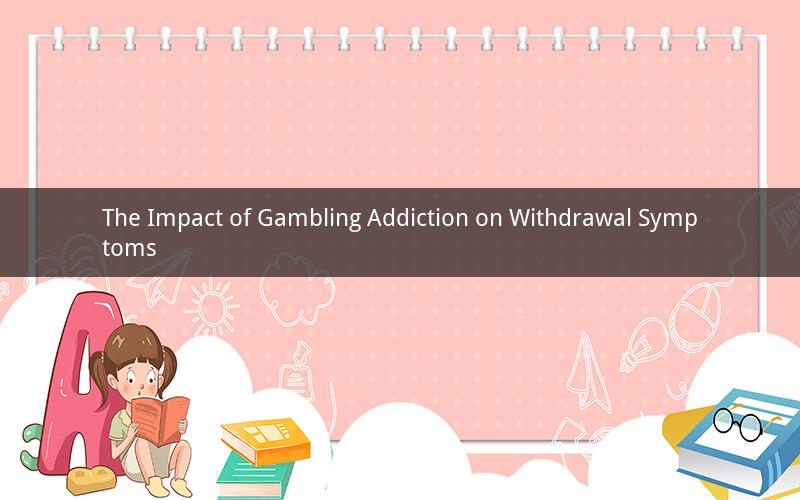
Introduction:
Gambling addiction is a serious issue that affects millions of individuals worldwide. It is characterized by an inability to control gambling behaviors, leading to significant financial, social, and psychological consequences. One of the critical aspects of gambling addiction is the occurrence of withdrawal symptoms when the addicted individual attempts to stop or reduce their gambling activities. This article delves into the question of whether gambling addiction can cause withdrawal symptoms and explores the various aspects surrounding this issue.
1. Understanding Gambling Addiction:
To comprehend the possibility of withdrawal symptoms in gambling addiction, it is essential to understand the nature of the addiction itself. Gambling addiction, also known as problem gambling or compulsive gambling, is classified as a behavioral addiction. It involves an uncontrollable urge to gamble, despite negative consequences. This urge often stems from the brain's reward system, which is activated when individuals win money or experience the thrill of gambling.
2. The Role of Dopamine in Gambling Addiction:
The brain's reward system is primarily regulated by a neurotransmitter called dopamine. When individuals engage in gambling activities, the release of dopamine creates a sense of pleasure and reinforces the desire to continue gambling. In gambling addiction, this dopamine release becomes dysregulated, leading to a heightened urge to gamble. When individuals attempt to stop or reduce their gambling, the brain's reward system may become unbalanced, resulting in withdrawal symptoms.
3. Symptoms of Withdrawal in Gambling Addiction:
Withdrawal symptoms in gambling addiction can manifest in various ways, similar to those observed in substance addictions. Some common withdrawal symptoms include:
- Anxiety: Individuals may experience heightened levels of anxiety, restlessness, and irritability when attempting to stop gambling.
- Depression: Feelings of sadness, hopelessness, and a general sense of depression may arise as a result of the loss of control over gambling and the subsequent consequences.
- Insomnia: Difficulty falling asleep, staying asleep, or experiencing disrupted sleep patterns may occur.
- Mood swings: Fluctuations in mood, including irritability, moodiness, and emotional instability, can be common during withdrawal.
- Compulsive behaviors: The urge to gamble may become even stronger during withdrawal, leading to a higher risk of relapse.
4. Treatment and Management of Withdrawal Symptoms:
Managing withdrawal symptoms in gambling addiction is crucial for successful recovery. Various treatment approaches can be utilized, including:
- Cognitive-behavioral therapy (CBT): CBT focuses on identifying and modifying negative thought patterns and behaviors associated with gambling addiction. It can help individuals develop healthier coping mechanisms and reduce the urge to gamble.
- Support groups: Joining support groups, such as Gamblers Anonymous, can provide individuals with a sense of community and support from others who have experienced similar challenges.
- Medication: In some cases, medication may be prescribed to help manage withdrawal symptoms. Antidepressants or anti-anxiety medications may be used to alleviate symptoms such as depression, anxiety, and insomnia.
- Relapse prevention strategies: Learning and implementing relapse prevention strategies can help individuals recognize triggers and develop coping mechanisms to avoid relapse.
5. Conclusion:
In conclusion, gambling addiction can indeed cause withdrawal symptoms. The urge to gamble becomes deeply ingrained in the brain's reward system, and attempting to stop or reduce gambling activities can disrupt this system, leading to withdrawal symptoms. Understanding the nature of gambling addiction and the potential for withdrawal symptoms is crucial for effective treatment and recovery. By seeking appropriate support and utilizing various treatment approaches, individuals can overcome gambling addiction and manage withdrawal symptoms.
Questions and Answers:
1. Q: Can withdrawal symptoms from gambling addiction be severe?
A: Yes, withdrawal symptoms from gambling addiction can be severe, similar to those observed in substance addictions. They can include intense cravings, anxiety, depression, mood swings, and insomnia.
2. Q: Are there any medical treatments available for gambling addiction withdrawal?
A: Yes, medication can be prescribed to help manage withdrawal symptoms. Antidepressants and anti-anxiety medications may be used to alleviate symptoms such as depression, anxiety, and insomnia.
3. Q: Can therapy help with gambling addiction withdrawal?
A: Yes, therapy, particularly cognitive-behavioral therapy (CBT), can be highly effective in managing gambling addiction withdrawal. CBT helps individuals develop healthier coping mechanisms and modify negative thought patterns associated with gambling.
4. Q: How long do withdrawal symptoms typically last in gambling addiction?
A: The duration of withdrawal symptoms in gambling addiction can vary from person to person. Some individuals may experience symptoms for a few days, while others may experience them for several weeks or even months.
5. Q: Can withdrawal symptoms lead to relapse in gambling addiction?
A: Yes, withdrawal symptoms can increase the risk of relapse in gambling addiction. The urge to gamble may become even stronger during withdrawal, making it crucial for individuals to have a strong support system and relapse prevention strategies in place.